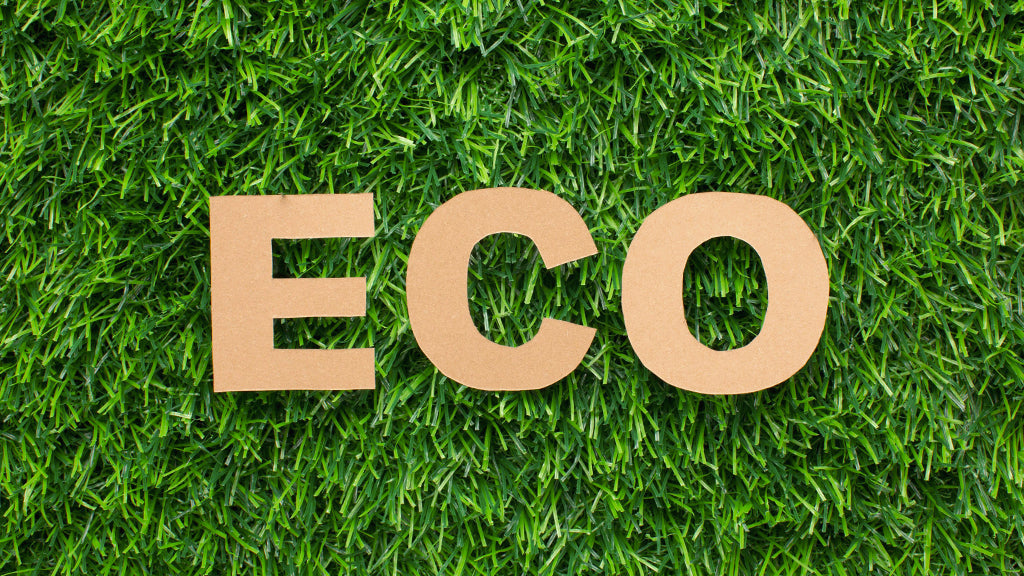

What does "Eco-Friendly" Really Mean?
Eco-friendly literally means earth-friendly, ie. not harmful to the environment. This term most commonly refers to products that contribute to green living or practices that help conserve resources like water and energy. Eco-friendly products also prevent contributions to air, water and land pollution. You can engage in eco-friendly habits or practices by being more conscious of how you use resources. For more information, check out my Earth Day, Every Day post.
"Eco-friendly" has become a broad term. An increasing number of products today are described as “eco-friendly” and biodegradable. However, not all of them live up to the environmentally friendly label. Even those that do make the grade as certified biodegradable or compostable don’t end up where they should.
Out of all the sustainability-related terms you hear tossed around today recyclable is probably the single most used and distinct of the three. Merriam-Webster defines recyclable as, “to make something new again” which, in its essence, is pretty simple.
But it's become a "catch-all" term for sustainability... and not everything is "recyclable" and theres a big different between recyclable and compostable items.
So lets break down the differences between recyclable, biodegradable, and compostable.

What does it mean?
Recyclable products can be collected and diverted from landfills to be treated & reprocessed to make new materials that are suitable for reuse and new products.
What classifies?
The most common recyclable items include paper, cardboard, plastic, glass, aluminum and electronic waste. Recyclability relies heavily on the consumer and the consumer's access to recycling management centers.
Where to dispose of?
The easiest way to recycle is through your municipal curbside garbage program, assuming such
a program is available.
Find out what sorts of materials are accepted through your local program,
and how the materials should be separated to ensure they are processed correctly.
For more information about finding recycling guides and locations near you, PLUS guidance for eco-friendly living, sustainable purchasing choices, and making choices to protect our planet, head over to Earth911.com

What does it mean?
Biodegradable products are capable of breaking down through the action of living organisms in a reasonable amount of time in a natural environment.
What classifies?
Some items are obviously biodegradable, which includes food scraps and wood that hasn't been treated with chemicals to resist bugs and rot. Most paper and other products made from plant materials will also biodegrade relatively easily.
Where to dispose of?
Products that are labeled as
biodegradable can be disposed
of in your garbage.
However it
is important to remember that
landfills lack the microorganisms
and oxygen required for waste to
biodegrade in a timely manner,
so you should still try to minimize
your use of items that are not
recyclable or compostable.

What does it mean?
Compostable products are biodegradable - with the extra benefit of also being capable of releasing nutrients into the soil that aids in the growth of plants with no toxic residues.
What classifies?
Compostable products are commonly made out of PLA (polylactic acid), bagasse (sugarcane fiber) or vegetable starch. It is environmentally preferable to use disposable products that are labeled “compostable” rather than just “biodegradable.”
Where to dispose of?
Products that are labeled compostable should enter an industrial composting facility to fully degrade into organic matter.
If your city has a composting facility, place these products in your
compost collection bins to be picked up. If your city doesn’t provide industrial composting, you can dispose of compostable products in your
backyard or home composter, but they will take longer to degrade.
If you do not have access to a compost facility or a home composter, dispose of the compostables in the garbage.
Do not put
compostables into your recycling! They are not recyclable and will contaminate the recycling process.
Further reading:
- BecauseHealth's article: Biodegradable vs Compostable vs Recyclable.
- Recology's Sorting Education Guides and Resources
- UCSF Office of Sustainability: Recycling & Waste Reduction Program
- WCP Solutions: Compostable vs Recycled - Foodservice Products
- EcoCult: What’s the Difference Between Green, Sustainable, Eco-Friendly, Ethical, Fair Trade, Clean, Organic, Non-Toxic, and Conscious?
- EcoEnclose: Sustainable Packaging Resource Center
- HEALable: Resource for Conscious Consumerism Info on how ingredients, materials, and products impact health, animal welfare, environmental sustainability, and laborers.




